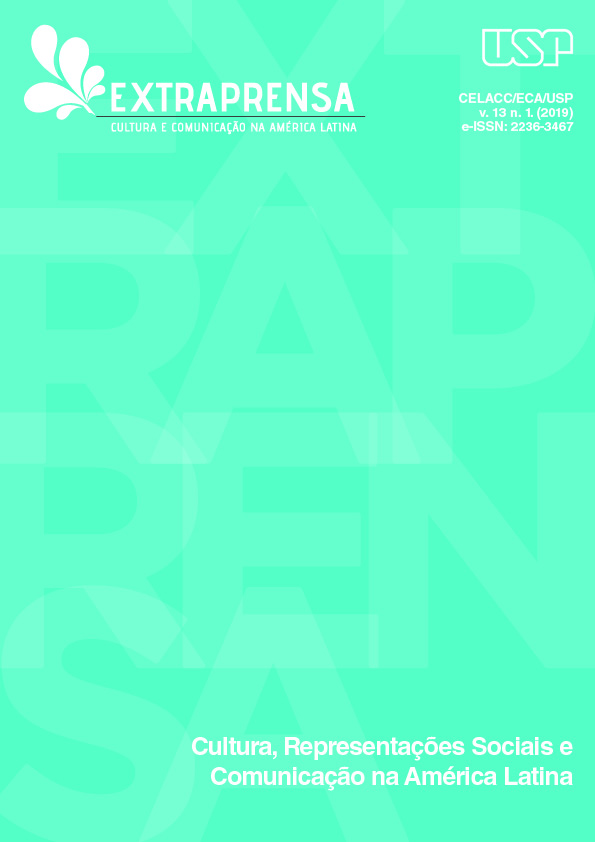The potential of cultural networks: interview with Manuel Gama
DOI:
https://doi.org/10.11606/extraprensa2019.164988Keywords:
Cultural Networks, Public Policy, Cultural ProductionAbstract
Understood as a proper foundation of collective or social life, the idea of network can be characterized, in general, as a communicative and informational system capable of dynamizing actions and interactions between individuals, groups, institutions, cities and countries. Despite being a technology with ambivalent potential since any social agent can use it, its use in the field of cultural production has led governments and international agencies to encourage the so-called networking. The potentialities of inclusion, democratic participation and mutual benefit have been some of the justifications for encouraging this systemic practice. Manuel Gama proposes that in networking the individual affects and is affected, being the subject and subjected. In this present interview, this notion of network reflects the way Gama identified his studies with initiatives that took place in Portugal and, later, in other countries. Discovering how a cultural network operates seems to be his greatest asset in understanding the opportunities and particularities of culture.
Downloads
References
BARBEDO, Francisco (coord.). Rede portuguesa de arquivos (RPA): fundamentos para o seu desenvolvimento e gestão. Porto: [s. n.], 2008. (Módulo 1: modelo conceptual).
BRUN, Javier; TEJERO, Joaquín; LEDO, Pedro. Redes culturales. Claves para sobrevivir en la globalización. Madrid: Agencia Española de Cooperación Internacional para el Desarrollo, 2008.
CAMACHO, Clara. A rede portuguesa de museus e os museus com colecções de arqueologia – parâmetros de sustentabilidade. Revista da Faculdade de Letras: Ciências e Técnicas do Património, Porto, v. VII-VIII, p. 107-114, 2002. (I Série).
CARNEIRO, Luís et al. Redes colaborativas de elevado desempenho no Norte de Portugal. Porto: Inesc, 2007.
CARRILHO, Tiago. Conceito de parceria: três projectos locais de promoção do emprego. Análise Social, Lisboa, v. XLIII, n. 1, p. 81-107, 2008.
CASTELLS, Manuel. A era da informação: economia, sociedade e cultura. Lisboa: Fundação Calouste Gulbenkian, 1996. (v. I: A sociedade em rede).
CENTENO, Maria João. As organizações culturais e o espaço público: a experiência da rede nacional de teatros e cineteatros. Tese (Doutorado em Ciências da Comunicação) – Faculdade de Ciências Sociais e Humanas, Universidade Nova de Lisboa, Portugal, 2010.
CRISTÓVÃO, Artur et al. (coord.). Uma rede para o futuro? Estudo de avaliação da COMUM – Rede Cultural. Vila Real: Universidade de Trás-os-Montes e Alto Douro, 2006.
FERREIRA, Claudino et al. (coord.). 5 SENTIDOS Estudo sobre a rede de programação cultural. Coimbra: Centro de Estudos Sociais, 2016.
GONZÁLEZ, Javier (coord.). Estudio sobre redes y circuitos de espacios escénicos públicos en España 2006-2010. La red española de teatros, auditorios, circuitos y festivales de titularidad pública. Madrid: Gobierno de España, 2012.
LAACKSONEN, Annamari. D’Art Report 49: International Culture Networks. Strawberry Hills: International Federation of Arts Councils and Culture Agencies, 2016.
OLEIRO, Margarida; HEITOR, Célia. 20 Anos da Rede Nacional de Bibliotecas Públicas: um balanço (possível) do grau de cumprimento do Programa. ACTAS: Congresso Nacional de Bibliotecários, Arquivistas e Documentalistas, Lisboa, n. 10, p. 1-7, 2010.
RUBIM, Antônio, PITOMBO, Mariella; RUBIM, Iuri. Políticas e redes de intercâmbio e cooperação em cultura no âmbito ibero-americano. In: ENCONTRO DE ESTUDOS MULTIDISCIPLINARES EM CULTURA, 1., 2005, Salvador. Anais […]. Salvador: Ufba, 2005. p. 1-52.
SANTOS, Maria de Lourdes (coord.). Contribuições para a formulação de políticas públicas no Horizonte 2013 relativas ao tema Cultura, Identidades e Património: relatório final. Lisboa: Observatório das Actividades Culturais, 2005.
SILVA, Augusto. As redes culturais: Balanço e perspectivas da experiência portuguesa, 1987-2003. In: GOMES, Rui Telmo (coord.). Os públicos da cultura (241-283). Lisboa: Observatório das Actividades Culturais, 2004.
SIMÕES, Jorge. Cidades em rede e redes de cidades: o movimento das cidades educadoras. Vila Nova de Famalicão: Edições Húmus, 2011.
Downloads
Published
Issue
Section
License
Ao submeter qualquer material científico para Extraprensa, o autor, doravante criador, aceita licenciar seu trabalho dentro das atribuições do Creative Commons, na qual seu trabalho pode ser acessado e citado por outro autor em um eventual trabalho, porém obriga a manutenção de todos os autores que compõem a obra integral, inclusive aqueles que serviram de base para o primeiro.
Toda obra aqui publicada encontra-se titulada sob as seguintes categorias da Licença Creative Commons (by/nc/nd):
- Atribuição (de todos os autores que compõem a obra);
- Uso não comercial em quaisquer hipóteses;
- Proibição de obras derivadas (o trabalho não poderá ser reescrito por terceiros. Apenas textos originais são considerados);
- Distribuição, exibição e cópia ilimitada por qualquer meio, desde que nenhum custo financeiro seja repassado.
Em nenhuma ocasião a licença de Extraprensa poderá ser revertida para outro padrão, exceto uma nova atualização do sistema Creative Commons (a partir da versão 3.0). Em caso de não concordar com esta política de Direito Autoral, o autor não poderá publicar neste espaço o seu trabalho, sob pena de o mesmo ser removido do conteúdo de Extraprensa.







